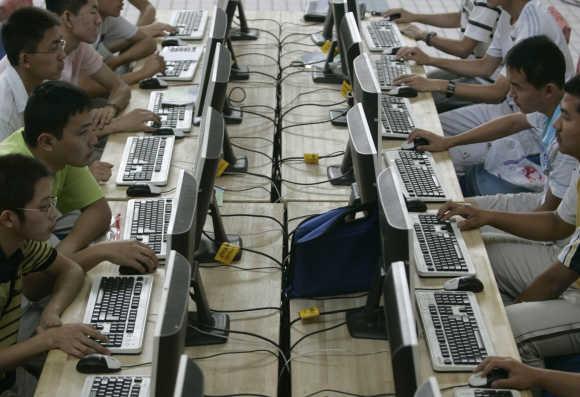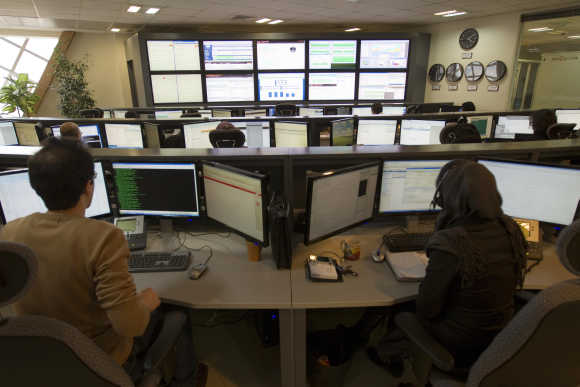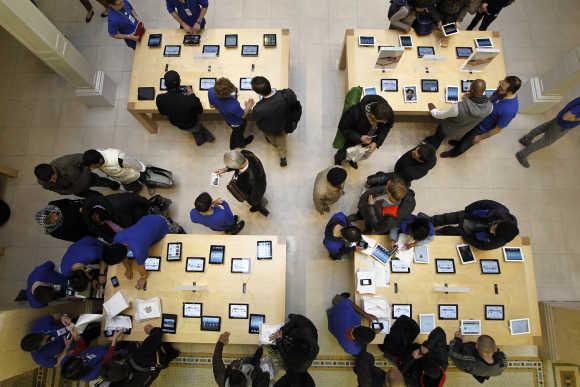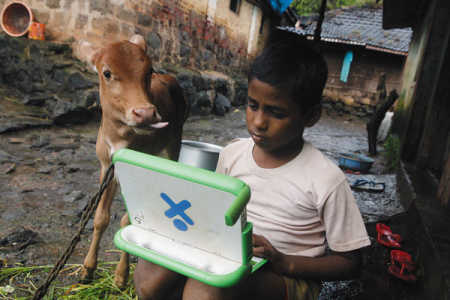 | « Back to article | Print this article |
Safety nets for child techies
Whatever be the age of a child, the necessity to limit internet browsing hours is always felt by parents.
There has been a steady increase in the number of young children using the internet at home, thanks to the popularity of social networking sites, online gaming and music streaming websites.
Add to that the growing number of smartphones and tablet PCs in urban households that allow unrestricted internet access to children, and there's a definite problem at hand.
A study by McAfee, titled 'How safe are Indian kids online?' across 10 cities in the country, revealed 62 per cent of all children polled have shared personal information online and 12 per cent of all children polled had been victims of some kind of cyber threat.
Click NEXT to read further. . .
Safety nets for child techies
The report said India, with 17.32 per cent of consumers without any security protection software on their PCs was the 10th among least-protected countries.
But how exactly can parents limit their children's exposure to adult materials online, which may be considered pornographic or harmful to children, in addition to protecting them from security threats, online bullying and more?
Not to mention children can also harm the system by infecting the device with all sorts of malware to changing settings and deleting important apps or data stored on the device.
CONTROLLING THE HOME PC
"It is not hard to see an intended '5 minutes on the internet' turn into hours.
"If your child is responsible online and knows what to do if he/she runs into any danger, then parental-control software's main benefit is giving that little extra peace of mind," says Nagpur-based restaurateur Subhash Bhide, father of a 14-year-old.
Click NEXT to read further. . .
Safety nets for child techies
Bhide uses in-built parental controls to set time limits on his Windows 7 home PC, and also controls access to specific games while blocking certain programmes.
"I have even enabled content filtering features through add-ons or extensions on the internet browsers on my PC," he adds.
Most Internet security packages have evolved far beyond simple anti-virus programmes, with tools that can be used for child-proofing a computer.
One of the popular ones is Symantec's Norton Internet Security, which packs several parental controls.
Parents can control web browsing by blocking content, set time limits and keep a track of what their children search, and get information when children try to visit a blocked site.
"Parental controls are most effective when children also understand they should never give private information to anyone on the internet or by email, even information like age, gender, name, residential address or school address," points Shrividya P Vyas, mother of two children, aged 9 and 11, and who uses parental features on internet security suite on her laptop, which is also used by her children for school work.
Click NEXT to read further. . .
Safety nets for child techies
With her children having email ids (that are used for school work, and connect with friends), Vyas claims just telling the kids not to open a particular app or visit a certain website is not enough.
"Informing children what is off limits sometimes has the opposite effect and piques their interest," she says.
Vyas, who recently installed Kaspersky Internet Security 2013, which comes with detailed sets of parental controls, finds it useful to limit internet access to her children to play their favourite games to only on weekends.
Kaspersky allows parents to control specific contacts on their child's social network and instant messaging accounts.
This has the defensive benefit of protecting the children from bullies while ensuring they do not interact with strangers.
Click NEXT to read further. . .
Safety nets for child techies
Some dedicated parental control software like Net Nanny offers extended monitoring tools that allow parents to check their child's social networking activities, get reports on friends lists, pictures posted and personal information used. They can even check their children's instant messaging conversations.
SECURING THE MOBILE GATEWAY
Most mobile phones and tablet PCs are the easiest gateways for children to access the internet, social networking sites and instant messaging apps along with voice and text chat.
Most Android, iOS smartphones and tablet PCs lack built-in parental controls.
Though the Android Market app can be configured to require a password before downloading an app and one can set a PIN to get into the device, Android doesn't have a built-in mechanism to lock certain users out of certain apps.
"I realised my Android smartphone was the easiest way for my little one (12-year-old daughter) to log in to Facebook and play those social games with her friends," says Hari Punj, Mumbai-based advertising and marketing professional.
Punj experimented with several Android apps like NQ Family Guardian, Kyte and Norton Family Parental Control. "I found each of these apps extends granular protection options throughout the entire OS and not just the mobile web browser," he says.
Click NEXT to read further. . .
Safety nets for child techies
Depending on the app, parents often have the ability to hide certain apps from their children, block app downloads, schedule when children can use their phones (and who can call/text them), monitor activity and customise children-friendly homescreens.
In the case of app like NQ Family Guardian, parents can even use GPS to set up "safe zones" and check-ins for children.
The app then sends notifications about when children visit or leave specific locations.
Click NEXT to read further. . .
Safety nets for child techies
Punj underlines, "We all trust our children. But in this age, you don't want to leave anything to chance, especially when children are getting smarter than their parents."
Apple iOS users, on the other hand, have the ability to lock individual apps from the control panel.
One can enable or disable apps like the Safari web browser, YouTube, camera, and iTunes and prevent installation and uninstallation of apps.
Recently, Apple upgraded the operating system, and the new iOS 6 sports a feature called Guided Access that puts the iOS device into "guest user" (or "kid user") mode. Parents can set a passcode and launch an app to share -- the only thing children will be able to access (the home button will remain disabled until triple-clicked and passcode is entered).
Click NEXT to read further. . .
Safety nets for child techies
Parents of 17-year-old Kavish Bajaj gave him a smartphone last year. "While preparing for my competitive exams, I often spent considerable time between various coaching classes.
"So, my father gave me his Android phone to keep in touch at all times," says Bajaj. The teenager admits his smartphone habits are carefully monitored by his father, who installed McAfee Family Protection app on the device.
"I am not allowed to access certain websites, which have been predefined by my father. Also, I cannot uninstall the app since it is password protected," he says.
McAfee Family Protection (Android and iOS) is primarily used for its content filtering abilities and costs $20 (a year).
Click NEXT to read further. . .
Safety nets for child techies
Also, there are specialised apps like PhoneSheriff (available for Android, BlackBerry, iPhone, Symbian, and Windows phone) that can track a phone's location.
The app keeps a complete log of locations visited and even logs email, text, voice calls and photos for parents to ensure their children's safety.
PhoneSheriff, which costs about $50/year, can also block calls or texts from specific numbers (as defined by parents) along with outgoing calls or texts.
It's obvious you cannot keep your children away from using a smartphone or PC, but what you can do is prevent them from accessing things that you don't want them to see.









